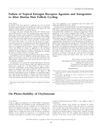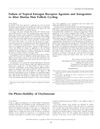Search
for
Sort by
Research
30 / 1000+ results
research Failure of Topical Estrogen Receptor Agonists and Antagonists to Alter Murine Hair Follicle Cycling
Topical estrogen treatments did not change hair growth in certain mouse strains, questioning previous findings on their role in hair growth control.
research A Systematic Review of Clinical Trials Using Single or Combination Therapy of Oral or Topical Finasteride for Women in Reproductive Age and Postmenopausal Women with Hormonal and Nonhormonal Androgenetic Alopecia
Oral and topical finasteride are effective and safe for treating female hair loss.

research Topical Estrogen Therapy for Androgenetic Alopecia in Menopausal Females
Topical estrogen helps hair growth in menopausal women with no major side effects.

research Finasteride Treatment of Hair Loss in Women
Finasteride may help some women with hair loss, but better options exist.

research Glucocorticoid and Sex Hormone Receptors: Clinical Implications and Therapeutic Relevance
Glucocorticoids and sex hormones affect skin health, with potential for targeted treatments to minimize side effects and treat skin conditions.

research On Photo-Stability of Oxybenzone
Estrogen receptors may not affect mouse hair growth as previously thought, and oxybenzone in sunscreen is stable in sunlight.

research Interventions for Female Pattern Hair Loss
Topical minoxidil helps treat female pattern hair loss, but more research needed for other treatments.

research Efficacy of Topical Minoxidil and Oral Spironolactone Versus Minoxidil and Finasteride in Androgenic Alopecia
Both minoxidil-spironolactone and minoxidil-finasteride treatments work for hair loss, but minoxidil-spironolactone is slightly more effective, especially in women.

research In Vitro Main Pathways of Steroid Action in Cultured Hair Follicle Cells: Vascular Approach
Steroids, particularly estrogens and 5α-reductase inhibitors, affect blood vessel-related hair growth processes in hair follicle cells.

research Finasteride and Its Potential for the Treatment of Female Pattern Hair Loss: Evidence to Date
Finasteride shows promise for female hair loss, but more research needed.

research Spironolactone May Be a Cause of Hormonally Associated Vestibulodynia and Female Sexual Arousal Disorder
Spironolactone might cause painful intercourse and decreased sexual arousal in women.

research Skin Abnormality and Hair Loss: The Reproductive Endocrinological Viewpoint
Hormonal imbalances can cause skin and hair problems in women, and treatments that block male hormones can help.

research Molecular Genetic and Endocrine Mechanisms of Hair Growth
Hormones and their receptors, especially androgens, play a key role in hair growth and disorders like baldness.

research Spironolactone May Cause Hormonally Associated Vestibulodynia and Female Genital Arousal Disorder
Spironolactone may cause sexual pain and arousal issues in women, which can improve after stopping the drug and using hormone cream.

research Effect of Estrogens on Skin Aging and the Potential Role of SERMs
Estrogens help reduce skin aging, and SERMs might offer similar benefits without the risks of hormone therapy.

research Use of Hair Products Containing Hormone or Placenta by US Military Personnel
About 15% of US Army personnel use hair products containing hormone or placenta, with higher usage among non-whites, females, and enlisted personnel.

research Current Concepts in Aesthetic Endocrinology
Hormones affect skin aging and fat distribution, and treatments can help, but only minoxidil is proven for female hair loss.

research Preoperative Hormonal Stimulation in Hypospadias: A Systematic Review
Hormone treatment before hypospadias surgery can increase penis size and reduce surgery complications.

research Estrogens and Aging Skin
Estrogen therapy can reduce skin aging but has cancer risks.

research The Distribution of Estrogen Receptor Beta Is Distinct to That of Estrogen Receptor Alpha and the Androgen Receptor in Human Skin and the Pilosebaceous Unit
Estrogen Receptor ß (ERß) is the main hormone controller in human skin and hair follicles, not Estrogen Receptor α (ERα) or the Androgen Receptor (AR).

research Sexual Hormones in Human Skin
Human skin makes sexual hormones that affect hair growth, skin health, and healing; too much can cause acne and hair loss, while treatments can manage these conditions.

research Why Some Women Look Young for Their Age
Women look young for their age due to larger lips, less sun damage, and genes that prevent gray hair and wrinkles.

research The Hair Follicle as an Estrogen Target and Source
Estrogens significantly influence hair growth by interacting with receptors in hair follicles and may help regulate the hair growth cycle.

research Estrogens and the Skin
Estrogen loss during menopause worsens skin health, but hormone replacement therapy may improve it, though more research is needed.

research Dietary Supplement Increases Anagen Hair Rate in Women With Telogen Effluvium: Results of a Double-Blind, Placebo-Controlled Trial
The dietary supplement helped increase hair growth in women with hair loss.

research Alopecia and the Metabolic Syndrome
Men with common hair loss may have a higher risk of heart disease and diabetes, and should be checked for these conditions.

research Female Pattern Hair Loss: Causes, Diagnosis, and Treatment Options
FPHL causes hair loss in women due to genetics and hormones; minoxidil and anti-androgens are treatments, and early intervention is advised.

research A Holistic Approach to Antiaging as an Adjunct to Antiaging Procedures: A Review of the Literature
Combining cosmetic procedures with lifestyle changes improves antiaging results.

research Dermatosis Associated with Menopause
Menopause can cause skin issues, and seeing a dermatologist helps.